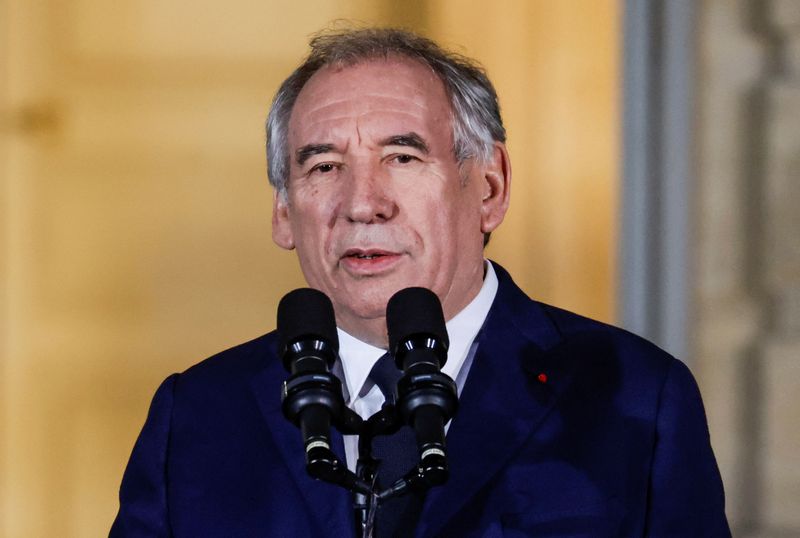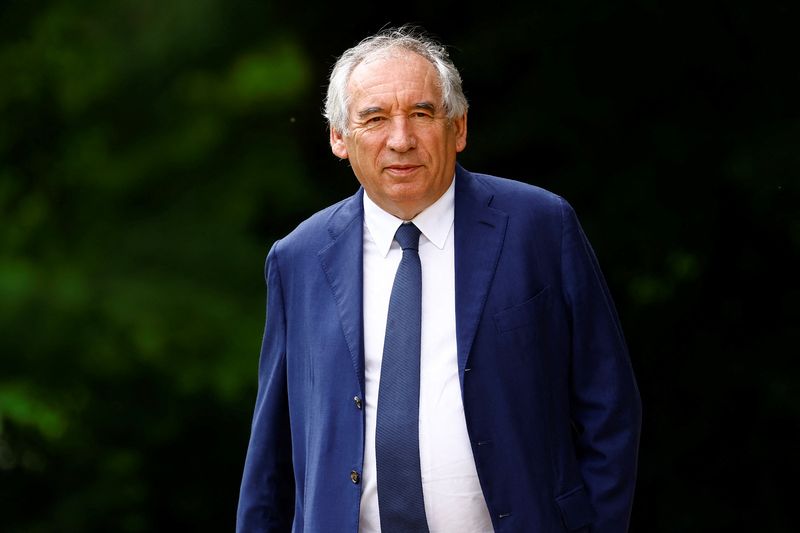By Gabriel Stargardter and Makini Brice
PARIS (Reuters) -New French Prime Minister Francois Bayrou said on Friday he faced a "Himalaya" of a challenge to tackle France's deficit, with opponents' lukewarm reactions to his appointment underlining the difficulty of the job he faces.
President Emmanuel Macron earlier named Bayrou as his fourth prime minister of 2024, tasking his centrist ally with steering France out of its second political crisis in six months. He replaces Michel Barnier, who was ousted by lawmakers last week for trying to pass a cost-cutting 2025 budget.
Bayrou, a three-time presidential candidate who has long warned of French fiscal profligacy, inherits the same rowdy parliament that felled Barnier. His proximity to the deeply unpopular Macron may also hurt him.
In a speech alongside Barnier on Friday, Bayrou acknowledged the challenge.
"Nobody knows the difficulty of the situation better than I do... I am not unaware of the Himalaya that stands before us," he said. "I believe that this issue, the deficit and debt, is an issue that poses a moral problem, not just a financial one."
Efforts to rein in the deficit, expected to close the year at over 6% of gross domestic product, lie at the heart of France's political malaise.
The festering crisis has raised doubts about whether Macron will complete his second presidential term until 2027, lifted French borrowing costs and left a power vacuum in the heart of Europe, just as Donald Trump prepares to return to the White House.
Bayrou's immediate priority will be passing a special law to roll over the 2024 budget, with a nastier battle over the 2025 legislation looming early next year.
Bayrou told reporters he wanted to move quickly, but France's stark political divisions mean even the basic task of naming his cabinet could drag on.
The Socialists, irked that the president ignored their demands for a leftist prime minister in favour of a "Macronista", said they would not join Bayrou's coalition, and could even seek to topple him if he tries to ram through the budget.
The pro-Barnier centre-right said it would wait to see Bayrou's proposals before deciding whether to join him, Laurent Wauquiez, the head of the Republican Right grouping in the National Assembly, wrote on X.
Far-left France Unbowed party leaders said they would be immediately seeking to remove Bayrou, while far-right National Rally (RN) party chiefs said they were willing to give him the benefit of the doubt for the time being.
IMPOSSIBLE JOB?
Bayrou, the founder of the Democratic Movement (MoDem) party which has been a part of Macron's ruling alliance since 2017, has been the longtime mayor of the southwestern town of Pau. His rustic roots are a key component of his political character.
The mixed reactions to Bayrou's appointment suggest he will likely be living day-to-day, at the mercy of Macron's opponents, for the foreseeable future. Barnier's three-month premiership was the shortest in modern French history.
Macron will hope Bayrou can stave off no-confidence votes until at least July, when France will be able to hold a new parliamentary election. But getting there won't be easy.
An early test will come with the 2025 budget bill negotiations, expected to start in January.
Barnier's bill, which aimed for 60 billion euros ($63 billion) in savings to assuage investors increasingly concerned by France's deficit, was deemed too miserly by the far-right and left. The government's failure to find a way out of the gridlock has seen French borrowing costs push higher.
XTB Research Director Kathleen Brooks said Bayrou's appointment was unlikely to have a major impact on French bonds. However, she said the CAC 40 French stock index is underperforming German stocks by a three-decade margin.
"With France still mired in political turmoil, narrowing this gap is an uphill struggle, even with a new PM," she wrote.

Macron named Bayrou as justice minister in 2017 but he resigned only weeks later amid an investigation into his party's alleged fraudulent employment of parliamentary assistants. He was acquitted of fraud charges this year.
($1 = 0.9537 euros)
